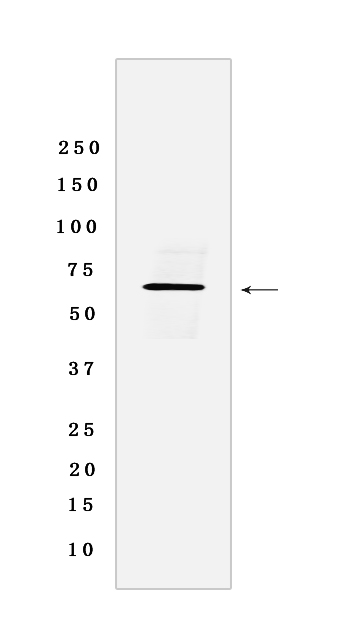CYP1B1 Rabbit mAb [5YS1]Cat NO.: A94468
Western blot analysis of extracts from Rat brain tissue lyaste.using CYP1B1 Rabbit mAb [5YS1] at dilution of 1:1000 incubated at 4℃ over night
Product information
Protein names :CYP1B1,CP1B1_HUMAN,Cytochrome P450 1B1
UniProtID :Q16678
MASS(da) :60,846
MW(kDa) :61 kDa
Form :Liquid
Purification :Protein A purification
Host :Rabbit
Isotype :IgG
sensitivity :Endogenous
Reactivity :Human,Rat
- ApplicationDilution
- 免疫印迹(WB)1:1000-2000
- 免疫组化(IHC)1:100,
- The optimal dilutions should be determined by the end user
Specificity :Antibody is produced by immunizing animals with a synthetic peptide of Human CYP1B1.
Storage :Antibody store in 10 mM PBS, 0.5mg/ml BSA, 50% glycerol. Shipped at 4°C. Store at-20°C or -80°C. Products are valid for one natural year of receipt.Avoid repeated freeze / thaw cycles.
WB Positive detected :Rat brain tissue lyaste
Function : A cytochrome P450 monooxygenase involved in the metabolism of various endogenous substrates, including fatty acids, steroid hormones and vitamins (PubMed:20972997, PubMed:11555828, PubMed:12865317, PubMed:10681376, PubMed:15258110). Mechanistically, uses molecular oxygen inserting one oxygen atom into a substrate, and reducing the second into a water molecule, with two electrons provided by NADPH via cytochrome P450 reductase (NADPH--hemoprotein reductase) (PubMed:20972997, PubMed:11555828, PubMed:12865317, PubMed:10681376, PubMed:15258110). Exhibits catalytic activity for the formation of hydroxyestrogens from estrone (E1) and 17beta-estradiol (E2), namely 2- and 4-hydroxy E1 and E2. Displays a predominant hydroxylase activity toward E2 at the C-4 position (PubMed:11555828, PubMed:12865317). Metabolizes testosterone and progesterone to B or D ring hydroxylated metabolites (PubMed:10426814). May act as a major enzyme for all-trans retinoic acid biosynthesis in extrahepatic tissues. Catalyzes two successive oxidative transformation of all-trans retinol to all-trans retinal and then to the active form all-trans retinoic acid (PubMed:10681376, PubMed:15258110). Catalyzes the epoxidation of double bonds of certain PUFA. Converts arachidonic acid toward epoxyeicosatrienoic acid (EpETrE) regioisomers, 8,9-, 11,12-, and 14,15- EpETrE, that function as lipid mediators in the vascular system (PubMed:20972997). Additionally, displays dehydratase activity toward oxygenated eicosanoids hydroperoxyeicosatetraenoates (HpETEs). This activity is independent of cytochrome P450 reductase, NADPH, and O2 (PubMed:21068195). Also involved in the oxidative metabolism of xenobiotics, particularly converting polycyclic aromatic hydrocarbons and heterocyclic aryl amines procarcinogens to DNA-damaging products (PubMed:10426814). Plays an important role in retinal vascular development. Under hyperoxic O2 conditions, promotes retinal angiogenesis and capillary morphogenesis, likely by metabolizing the oxygenated products generated during the oxidative stress. Also, contributes to oxidative homeostasis and ultrastructural organization and function of trabecular meshwork tissue through modulation of POSTN expression (By similarity)..
Tissue specificity :Expressed in heart, brain, lung, skeletal muscle, kidney, spleen, thymus, prostate, testis, ovary, small intestine, colon, and peripheral blood leukocytes (PubMed:8175734). Expressed in retinal endothelial cells and umbilical vein endothelial cells (at protein level) (PubMed:19005183)..
Subcellular locationi :Endoplasmic reticulum membrane,Peripheral membrane protein. Microsome membrane,Peripheral membrane protein. Mitochondrion.
IMPORTANT: For western blots, incubate membrane with diluted primary antibody in 1% w/v BSA, 1X TBST at 4°C overnight.


